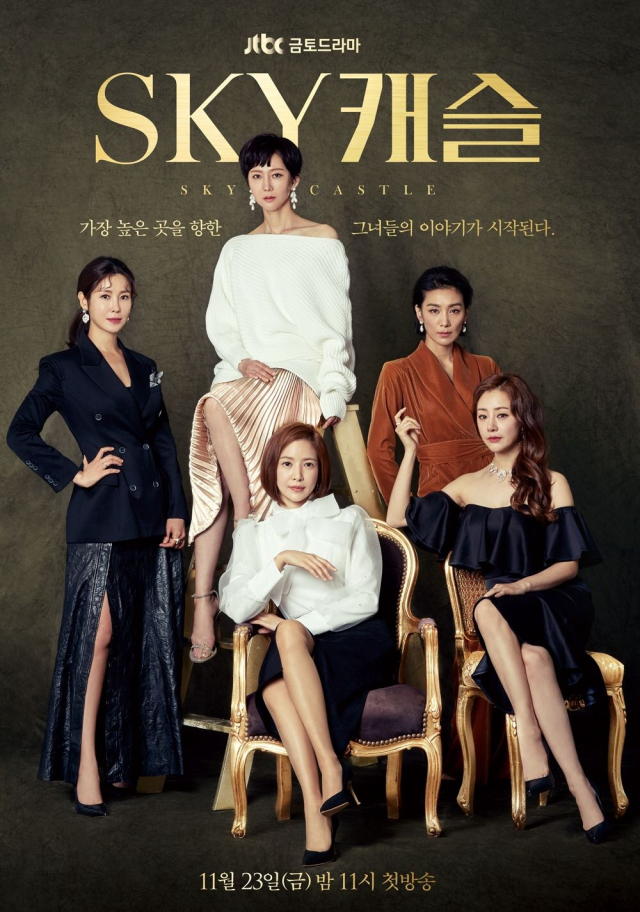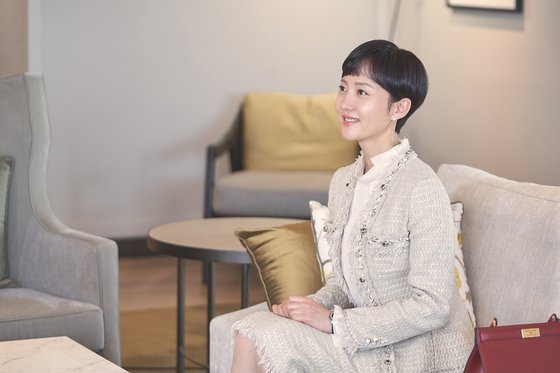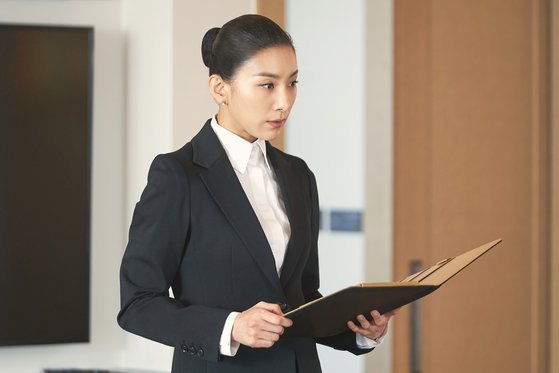JTBC’s Friday-Saturday drama “Sky Castle,” which centers on Korea’s overheated educational system, has been creating a buzz since its launch on Nov. 23. But beyond its depiction of the educational system, the story is about the importance of parenting and trials and tribulations of parenthood.
The drama revolves around the lives of housewives living in a luxurious residential area called Sky Castle in suburban Seoul. The name is also a reference to the country’s top three universities: Seoul National University, Korea University and Yonsei University.

Photo 3 / Poster for JTBC’s Friday-Saturday drama “Sky Castle” (JTBC)
The wealthy tiger moms, wives of doctors and an ex-politician, are determined to see their children enter Korea’s top medical school no matter what it takes. Money is no issue for them.
Seasoned actress Yum Jung-ah plays Han Seo-jin, a woman desperate for success. Upon getting married, she hired fake parents for herself to hide her poor background. Han’s utmost desire is for her daughter to be accepted into Seoul University’s School of Medicine and win the approval of her own mother-in-law.

Yum Jung-ah plays Han Seo-jin, who hires coordinator Kim Ju-young to make sure her daughter gains admission to Seoul University’s School of Medicine. (JTBC)
Desperate, Han hires an elite “university admissions coordinator,” even giving her gold bars to get her attention. This leads to tragedy. Now, after a series of events, her daughter trusts the coordinator even more than she trusts her own mother.
The mysterious coordinator Kim Ju-young, played by actress Kim Seo-hyung, has a secret. Two families she assisted in the past are in despair over suicides.

Kim Seo-hyung plays elite university admissions coordinator Kim Ju-young. (JTBC)
The drama series has drawn positive reviews as a black comedy that casts light on some of the darker portions of Korean society. Viewers were surprised when a bank invited its “VVIP” customers to introduce them to Kim. Han even intervened in the class president polls to get her daughter elected.
The drama avoids being corny by putting a fresh spin on classical plot devices. For example, Kim Hae-na is the hidden daughter of Han’s husband, which risks turning the series into just another Korean drama about “birth secrets.”
But Hae-na refuses to be a cliched character, breaking the unwritten law of Korean drama that all poor characters have to be sweet and kind.
Hae-na is smart and cunning, manipulating her peers and even the adults around her. The latest episode took an unexpected turn though, as she took her own life.
But it is more than just the education craze that has viewers gaga over the series. Beneath the surface, the show is about parenthood -- the hardships and importance of raising children.
The drama’s larger-than-life young characters go to extremes. Han’s daughter is impulsive, ignorant and arrogant. Han taught her to be proud of her genes and believe she is special because she has inherited superior genes.
Another example: In the latest episode, a family is in distress after learning that the daughter lied about attending Harvard University for a year. She had faked admission to the Ivy League school. Her confession shows how she was pressured by her father and thought she had to prove her worth even if by lying.
Viewers can empathize with the characters, having experienced their own conflicts with parents or children.
Even outside the “Sky Castle,” parents and children find themselves in arguments over different ways of thinking. From children’s view, parents think they own them, treating them as mere belongings. On the other side, parents think children are ungrateful for all they provide.
The series saw its ratings rise from 1.7 percent viewership for its pilot episode in November to 15.8 percent on Saturday, according to Nielsen Korea. Ratings have risen consistently each week. It also broke the highest viewership rating for a JTBC drama, which previously marked 12.06 percent for “Woman of Dignity” in 2017.
Though initially created as a 16-episode drama, JTBC added four extra episodes as a result of the series’ growing popularity. The 20-part drama has six episodes left.
The JTBC drama series airs Fridays and Saturdays at 11 p.m.
By Im Eun-byel (
silverstar@heraldcorp.com)








![[Graphic News] More Koreans say they plan long-distance trips this year](http://res.heraldm.com/phpwas/restmb_idxmake.php?idx=645&simg=/content/image/2024/04/17/20240417050828_0.gif&u=)